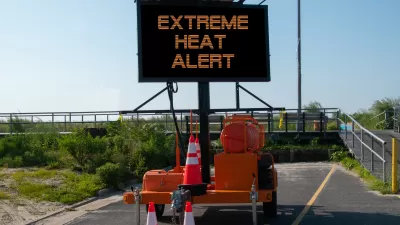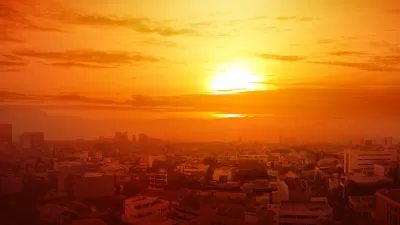As heat waves intensify, cities are seeking out heat mitigation techniques that can be applied widely and benefit entire neighborhoods.

With extreme heat becoming a severe health risk in more U.S. cities, local governments are looking for ways to mitigate its impacts at larger scales, reports Ysabelle Kempe in Smart Cities Dive. “Five cities — Atlanta, Boston, Dallas, New Orleans and Columbia, South Carolina — will participate in a three-year project to scale up the adoption of surfaces that reduce urban heat, the nonprofit Smart Surfaces Coalition announced Thursday.”
The project is aimed at reducing barriers to scaling up heat mitigation projects to make a difference at the neighborhood level. “The coalition’s analysis of citywide ‘smart surfaces’ adoption in Baltimore found that the strategy could cool the city by 5 degrees Fahrenheit and provide more than $10 in cost savings for every $1 spent.”
Kurt Shickman, director of extreme heat initiatives at the Adrienne Arsht-Rockefeller Foundation Resilience Center, explains the challenges, saying, “a city may not be able to plant trees where they would provide the most value if the land is private property or owned by, say, a water utility or public transportation authority. Shickman suggested that cities could develop incentives or even regulation to encourage cooling changes to the built environment.”
The Smart Surfaces Coalition says it can fund ten projects and welcomes applications from more cities.
FULL STORY: These 5 cities aim to cool down by scaling up ‘smart surfaces’ in coming years

Study: Maui’s Plan to Convert Vacation Rentals to Long-Term Housing Could Cause Nearly $1 Billion Economic Loss
The plan would reduce visitor accommodation by 25,% resulting in 1,900 jobs lost.

North Texas Transit Leaders Tout Benefits of TOD for Growing Region
At a summit focused on transit-oriented development, policymakers discussed how North Texas’ expanded light rail system can serve as a tool for economic growth.

Why Should We Subsidize Public Transportation?
Many public transit agencies face financial stress due to rising costs, declining fare revenue, and declining subsidies. Transit advocates must provide a strong business case for increasing public transit funding.

How to Make US Trains Faster
Changes to boarding platforms and a switch to electric trains could improve U.S. passenger rail service without the added cost of high-speed rail.

Columbia’s Revitalized ‘Loop’ Is a Hub for Local Entrepreneurs
A focus on small businesses is helping a commercial corridor in Columbia, Missouri thrive.

Invasive Insect Threatens Minnesota’s Ash Forests
The Emerald Ash Borer is a rapidly spreading invasive pest threatening Minnesota’s ash trees, and homeowners are encouraged to plant diverse replacement species, avoid moving ash firewood, and monitor for signs of infestation.
Urban Design for Planners 1: Software Tools
This six-course series explores essential urban design concepts using open source software and equips planners with the tools they need to participate fully in the urban design process.
Planning for Universal Design
Learn the tools for implementing Universal Design in planning regulations.
Ascent Environmental
Borough of Carlisle
Institute for Housing and Urban Development Studies (IHS)
City of Grandview
Harvard GSD Executive Education
Toledo-Lucas County Plan Commissions
Salt Lake City
NYU Wagner Graduate School of Public Service





























